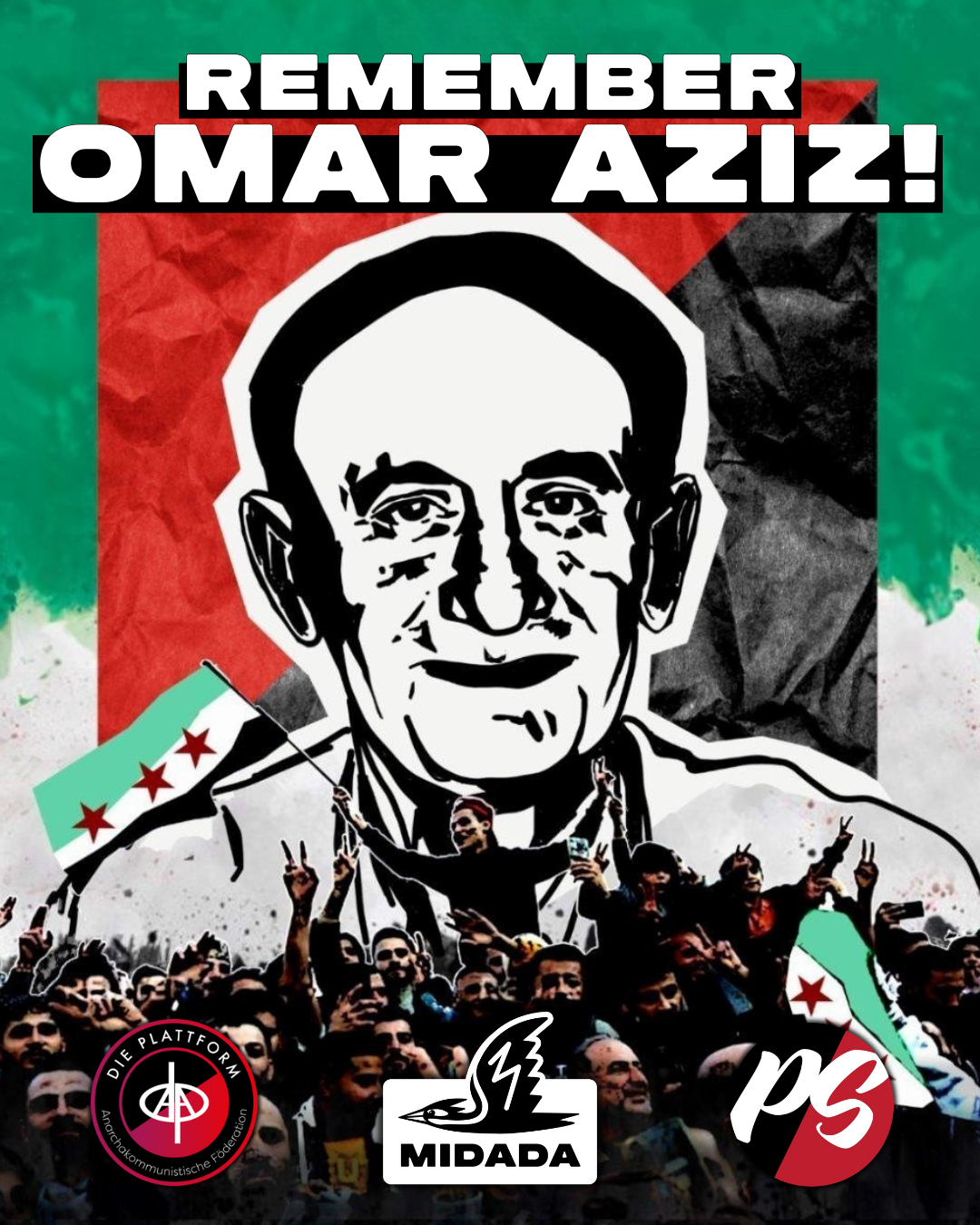(English translation below)
Omar Aziz, geboren 1949 in Damaskus, war ein Intellektueller, Ökonom und Anarchist mit einem massgeblichen Einfluss auf die syrische Revolution seit 2011. Nach Jahren im Exil kehrte er kurz nach Beginn der Proteste in seine Heimat zurück, um die revolutionäre Bewegung aktiv zu unterstützen. Gemeinsam mit lokalen Anwohner*innen sammelte er humanitäre Hilfe und verteilte sie in von Regimeangriffen betroffenen Vororten von Damaskus.
Aziz förderte damit lokale Selbstverwaltung, horizontale Organisation, Solidarität und gegenseitige Hilfe als Mittel zur Befreiung von staatlicher Tyrannei. Zusammen mit anderen Revolutionär*innen gründete er das erste lokale Komitee in Barzeh, Damaskus. Das Modell der lokalen Komitees nach diesem Vorbild verbreitete sich landesweit und wurde zu einem der vielversprechendsten Beispiele nicht-hierarchischer Selbstorganisation im Arabischen Frühling.
Omar Aziz erkannte jedoch auch die Mängel der syrischen Revolution. So kritisierte er die fehlende Verbindung zwischen revolutionären Aktivitäten und dem Alltagsleben der Menschen. Aziz betonte, dass es nicht ausreiche, an Demonstrationen teilzunehmen und gleichzeitig in den vom Staat auferlegten hierarchischen Strukturen weiterzuleben. Er beschrieb dies als das Nebeneinander von „der Zeit der Macht“, die das tägliche Leben bestimmt, und „der Zeit der Revolution“, die von den Revolutionär*innen gestaltet wird.
Für einen nachhaltigen Erfolg der Revolution forderte er, dass revolutionäre Aktivitäten alle Lebensbereiche durchdringen und radikale Veränderungen in der sozialen Organisation und den zwischenmenschlichen Beziehungen bewirken. Aziz sah positive Beispiele in den zahlreichen Initiativen im ganzen Land, wie der freiwilligen Bereitstellung von medizinischer und rechtlicher Unterstützung, der Umwandlung von Häusern in Feldlazarette und der Verteilung von Lebensmittelpaketen. Er betrachtete diese Handlungen als Ausdruck des Widerstandsgeistes des syrischen Volkes gegen die Brutalität des Regimes. Sein Ziel war es, diese Praktiken durch die Einrichtung lokaler Räte zu verbreiten.
Heute, am 16. Februar 2025 , 12 Jahre nach seinem Tod, erinnern wir an Omar Aziz und seine Vision einer revolutionären Selbstorganisation. Sein Erbe lebt in den fortwährenden Kämpfen für eine gerechtere und solidarischere Welt weiter.
Für eine Welt jenseits von Unterdrückung und Autorität. In Solidarität mit unserer Schwesterorganisation Têkoşîna Anarşîst.
“If the revolution fails, my life and that of my whole generation would be devoid of meaning… all that we have dreamt of and believed in would have been mere illusion.”
— Omar Aziz
In Memory of Omar Aziz – 12 Years After His Death
Omar Aziz, born in 1949 in Damascus, was an intellectual, economist, and anarchist who had a significant influence on the Syrian revolution since 2011. After years in exile, he returned to his homeland shortly after the protests began to actively support the revolutionary movement. Together with local residents, he gathered humanitarian aid and distributed it in Damascus suburbs affected by regime attacks.
With hist work, Aziz promoted local self-governance, horizontal organization, solidarity, and mutual aid as means of liberation from state tyranny. Together with other revolutionaries, he founded the first local committee in Barzeh, Damascus. The model of these local committees spread nationwide and became one of the most promising examples of non-hierarchical self-organization during the Arab Spring.
However, Omar Aziz also recognized the shortcomings of the Syrian revolution. He criticized the lack of connection between revolutionary activities and people’s everyday lives. Aziz emphasized that it was not enough to participate in demonstrations while continuing to live within the hierarchical structures imposed by the state. He described this as the coexistence of „the time of authority,“ which dictates daily life, and „the time of revolution,“ which is shaped by the revolutionaries.
For the revolution to achieve lasting success, he argued that revolutionary activities must permeate all aspects of life and bring about radical changes in social organization and interpersonal relationships. Aziz saw positive examples in the numerous initiatives across the country, such as the voluntary provision of medical and legal support, the transformation of homes into field hospitals, and the distribution of food packages. He viewed these actions as expressions of the Syrian people’s spirit of resistance against the regime’s brutality. His goal was to expand these practices through the establishment of local councils.
Today, on February 16, 2025, twelve years after his death, we remember Omar Aziz and his vision of revolutionary self-organization. His legacy lives on in the ongoing struggles for a world built on justice and solidarity.
For a world beyond oppression and authority. In solidarity with our sister organization, Têkoşîna Anarşîst.
„If the revolution fails, my life and that of my whole generation would be devoid of meaning… all that we have dreamt of and believed in would have been mere illusion.“
— Omar Aziz
☆ Die Plattform
☆ Midada
☆ Perspektive Selbstverwaltung

